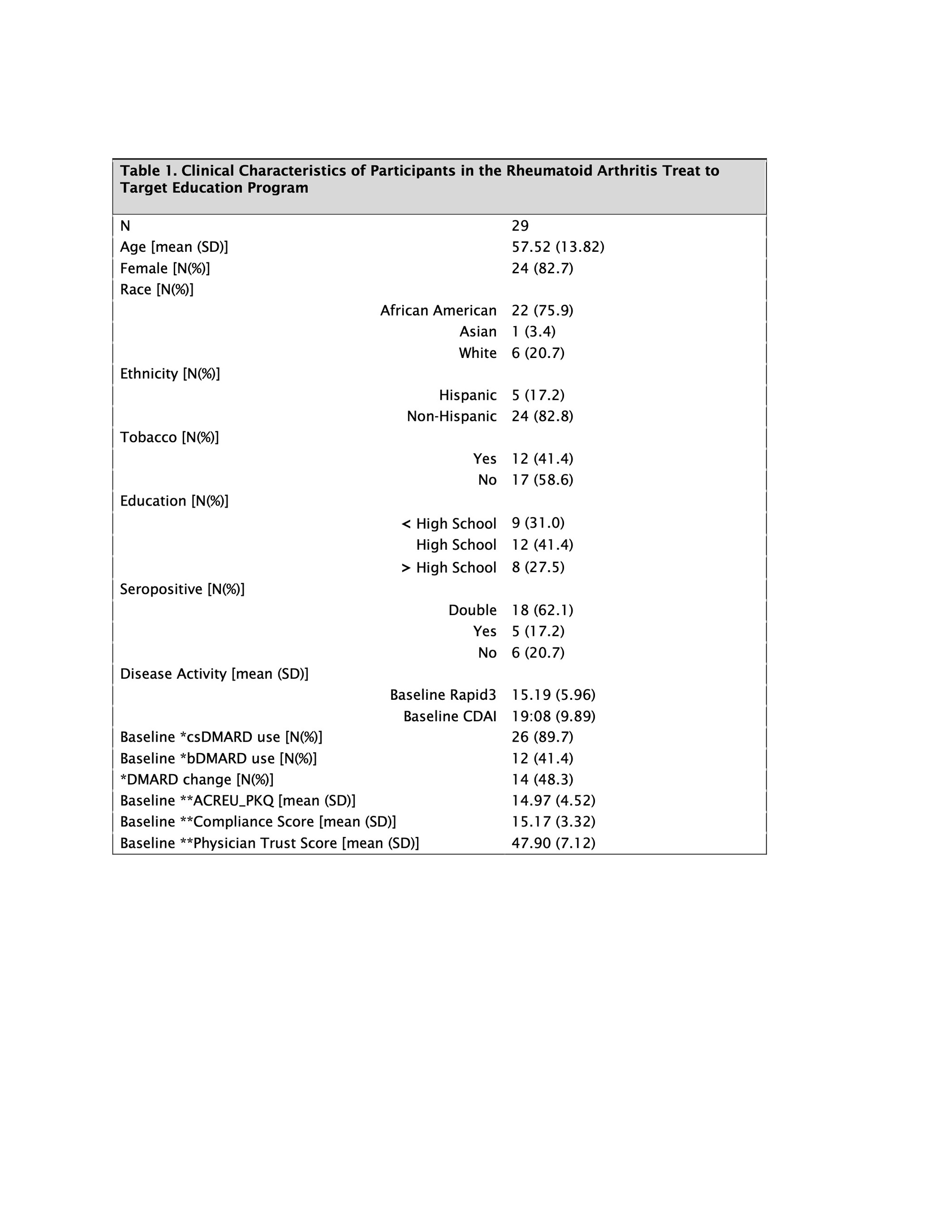Session Information
Date: Monday, November 13, 2023
Title: (1013–1032) Healthcare Disparities in Rheumatology Poster II: Socioeconomic Determinants
Session Type: Poster Session B
Session Time: 9:00AM-11:00AM
Background/Purpose: A successful treat to target (T2T) strategy in ethnic minority (EM) patients with rheumatoid arthritis (RA) could improve patient outcomes and help reduce healthcare disparity but requires patient engagement. In one prospective EM RA database, a low rate of meaningful clinical response was due in part to decreased biologic DMARD (bDMARD) utilization. Other known contributors include distrust of the medical system and medication hesitancy embedded in cultural norms. Education is a critical factor in encouraging self-active participation, medication adherence, and commitment to healthcare goals, but often requires lengthy one-on-one sessions with a provider. The aim of this study was to observe the effect of a Rheumatology Care Coordinator (RCC)-led education program on patient outcomes before and after a targeted education program focused on the T2T paradigm in RA.
Methods: Participants with RA and moderate-to-high disease activity (CDAI >10, RAPID3 >6) were enrolled. Each participant completed 5 T2T-focused education sessions scheduled with routine rheumatology office visits and facilitated by a RCC who completed 6 weeks of training on RA patient education. Translation services were utilized for non-English speaking participants. Demographic and clinical characteristics were recorded, as well as race and ethnicity of providers. Disease activity measures (CDAI and RAPID3), the Arthritis Community Research Evaluation Unit (ACREU) Patient Knowledge Questionnaire (PKQ), Compliance questionnaire and Trust in Physician Scale scores were recorded at Visit 1 and Visit 5. Meaningful clinical reduction in RAPID3 (-3.8) and CDAI (- 6) at Visit 5 was calculated. Descriptive statistics were used for demographic and clinical characteristics. Student’s t-test was used to assess RA-related knowledge acquisition, change in compliance, and change in disease activity.
Results: Over a mean study enrollment period of 10 (±3.4) months, there were 29 participants of mean age 57.52 ± 13.81 years, predominantly of African descent and female sex (83%) (Table 1). Most had at least high school education, one with a post graduate degree. The 4 participating providers were non-White. There was a high level of physician trust, which remained stable at the end of the study. There was no significant difference in ACREU scores (t = -0.07, p-value = 0.94), and although compliance scores improved, the difference was not significant (t = -1.94, p-value = 0.06). A significant decrease in RAPID3 (t = 2.70, p-value < 0.05, mean difference -3.98) and CDAI (t = 4.36, p-value < 0.05, mean difference -8.60) was seen, with meaningful clinical reduction in disease activity in 48% and 58% of patients, respectively. Almost 50% of participants had a change in DMARD, with 5 patients starting a new biologic therapy.
Conclusion: In a small urban cohort of predominantly African American patients with high school education, a successful T2T regimen was independent of educational level and targeted patient education. Achieving meaningful reduction in disease activity can be achieved in a setting where high physician trust enables shared decisions. The role of patient-provider race and ethnicity in achieving disease remission needs further evaluation.
**The Arthritis Community Research Evaluation Unit Patient Knowledge Questionnaire (ACREU_PKQ)
is scored out of 31. Compliance questionnaire is scored out of 20, and the Trust in Physician Scale is scored out of 55.
To cite this abstract in AMA style:
Dowell S, Quinones M, Jamshidi T, Jileaeva I, Kadiri O, Kerr G. Embedding Treat to Target Principles in Rheumatoid Arthritis Patient Education in Routine Care of Ethnic Minority Patients [abstract]. Arthritis Rheumatol. 2023; 75 (suppl 9). https://acrabstracts.org/abstract/embedding-treat-to-target-principles-in-rheumatoid-arthritis-patient-education-in-routine-care-of-ethnic-minority-patients/. Accessed .« Back to ACR Convergence 2023
ACR Meeting Abstracts - https://acrabstracts.org/abstract/embedding-treat-to-target-principles-in-rheumatoid-arthritis-patient-education-in-routine-care-of-ethnic-minority-patients/

